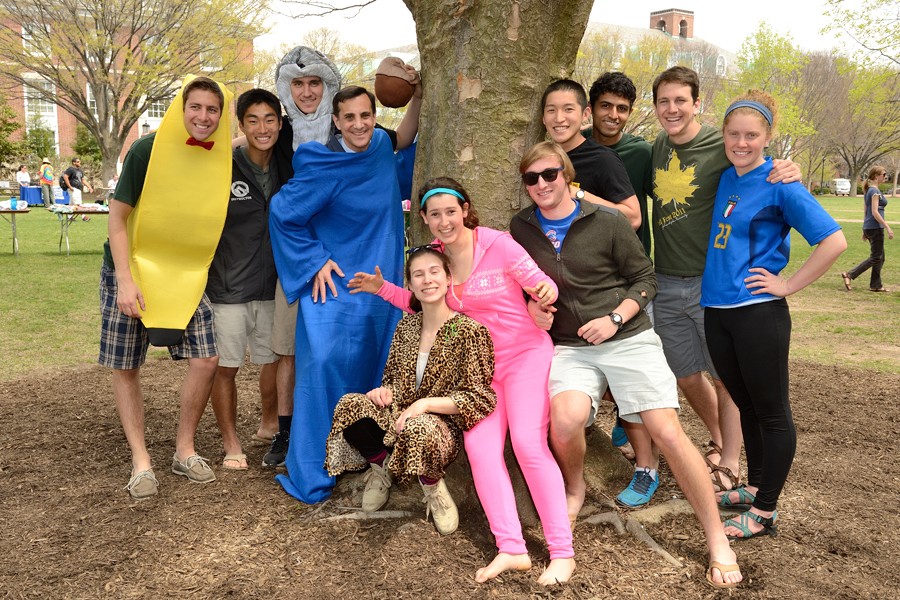Behold the power of fleece.
In a nod to low-tech ingenuity for sustainability's sake, President Ronald J. Daniels donned a blue Snuggie at the Johns Hopkins Earth Day Showcase on the university's Homewood campus to symbolically honor the many efforts under way to reduce the university's carbon footprint and safeguard the environment.
The fleece in question came from the "Snuggie Closet" at the university's Montgomery County Campus, which was put in place to offer students, staff, and faculty a way to warm up without turning up the thermostat and wasting energy.
Daniels didn't keep the fleece on long, however, as Mother Nature provided warm spring weather for the event, which featured an interactive expo of green-thinking student groups, JHU departments, and local organizations. Hundreds came out to the Keyser Quad to learn more about the university's environmental efforts, uncover opportunities to get involved, and participate in games and activities like waste sorting cornhole and a Hug-A-Tree photo contest.
The president used the occasion as a call to action to the university community to continue to enhance its greening efforts.
"What we are doing here [today] is celebrating the university's commitment to thinking holistically and creatively about the environment," Daniels said. "Doing so, as you all know, is an imperative."
In his speech, Daniels borrowed the words of Yale economist William Nordhaus, who in his latest book likened mankind's role in climate change to high stakes gambling and suggests we need to stop rolling the dice in this perillious game and "walk out of the climate casino" while there is still time.
"To do so, to walk out of this climate casino, we have to unite our thinking across disciplines, from ecology to economics and to politics," Daniels said. "This is as true at a local stage as it is on a global stage, and we see this play out daily at Johns Hopkins."
The university, Daniels said, has come a long way since the Hopkins Task Force on Climate Change released in 2008 its series of major recommendations, prominent among them a goal to reduce the university's greenhouse gas emissions by 51 percent by the year 2025.
To date, the university has reduced its emissions by 23 percent, an achievement made even more notable as it came during a period when the university increased its total campus size by 1,000,000 square feet. "We are growing," he said. "But we are growing smartly."
The reduction was made possible, Daniels said, by a "constellation" of projects, including outfitting buildings with solar panels and using locally sourced foods in dining halls.
But more can be done.
"So once again we are calling on leaders across the campuses to set an equally ambitious sustainability agenda for the next five years," Daniels said. "Our goal is another significant reduction in greenhouse gas emissions, and the tools we use to achieve this will vary from investing in smarter buildings to reimagining the way in which we consume energy within them."
Like wearing Snuggies in the winter.
The event also featured a Green Blue Jay Awards ceremony to honor inividuals and groups who have greatly contributed to the university's sustainability's efforts this past year.
The awards and winners are:
"Three Legged Stool" goes to the Applied Physics Laboratory for its chiller optimization project. This award recognizes an effort that exemplifies the three integral pieces of sustainability—economic, environmental, and social. APL optimized efficiency of its existing chillers and cooling towers, and replaced older chillers with new high-efficiency units. The projects improved plant efficiency between 35 and 45 percent, and APL expects to save $295,000 annually in electricity costs.
"Change from Within" goes to the School of Education for its school supply collection effort. This award recognizes individuals who have demonstrated leadership in transforming practices and protocols in ways that produce wide-ranging university impact. Since 2008, a group of SoE staff members have periodically collected surplus school supplies and distributed them to Baltimore-area teachers. The effort became a permanent program this past winter, and the Homewood Recycling Office and other units got involved. In the last few months, approximately 20 boxes of supplies have been collected, which range from common items such as binders and notepads, to 3D globes.
"Sustainability Exposed" goes to JHU Transportation for its CNG (compressed natural gas) project. This award recognizes a significant effort that helped make the vision of sustainability more accessible and visible to the Johns Hopkins community. During summer 2013, JHU Transportation coordinated the installation of a compressed natural gas station at the rear of San Martin Garage. The university currently has four CNG-powered vans to put into rotation at Blue Jay Shuttle. CNG burns much cleaner than gasoline, helping to reduce university fleet emissions, and will bring overall operating costs for Blue Jay Shuttle down significantly.
"Spirit of Sustainability" goes to Judah Adashi, a composition teacher at the Peabody Institute. This award recognizes the person who demonstrates a unique enthusiasm for sustainability at Johns Hopkins that inspires change in others. Adashi has explored innovative means to reduce paper use in a curriculum traditionally dominated by reams of music sheets. His enthusiasm, and advisory role to the Peabody Green Group, has helped foster a sense of sustainable values among Peabody students.
"Green Partner of the Year" goes to Ballinger and Whiting Turner for their work on the Undergraduate Teaching Labs. This award recognizes an organization that has shown exceptional commitment to sustainability on one or more Johns Hopkins campuses. Through energy wheels that recover heat and moisture from exhaust air, to sophisticated chilled beam infrastructure and high-efficiency fume hoods, the UTL building is projected to use 40 percent less energy than a similar code-compliant laboratory building. The area landscaping was designed to help filter storm water runoff.
"Division of the Year" goes to the Bloomberg School of Public Health. This award recognizes the division that has made the most significant progress over the course of the past year. The Bloomberg School has implemented initiatives that run the gamut of sustainability: including building of the Johns Hopkins Bioreposity, the window film project on the Wolfe St. Building, the Green Student Group's water bottle waste reduction efforts and installing Baltimore's first outdoor bike repair station.
"Student Group of the Year" goes to Take Back the Tap. This award recognizes the Johns Hopkins student group that has made the biggest impact during the past year. Throughout 2013, the Office of Sustainability, Plant Operations, and the student chapter of "Take Back the Tap" conducted a comprehensive inventory of all campus water fountains to assess ways to make it easier to refill reusable water bottles. In early 2014, numerous fountains were replaced or retrofitted, and TBTT students have hosted numerous outreach events and campaigns to promote these upgrades.
"Zero to Hero" goes to New Student Orientation. This award highlights an event that exemplifies great progress in incorporating zero-waste principles. Using orientation events and programming both as an educational and experiential opportunity for exposing students to sustainability, the Student Activities Department (specifically Rachel Drennen) helped reduce environmental impact and foster a culture of sustainability in new Johns Hopkins students. Examples of key initiatives include reducing printed communications, consolidating giveaways to reduce waste, and hosting the zero-waste BBQ, with all provisions being recyclable or compostable.
"Wacky and Wonderful" goes to the Montgomery County Campus. This award recognizes a sustainability effort that goes outside the box to creatively advance sustainability values and action at JHU. Instead of raising the temperature even further in the winter months, MCC corrected some heating system issues and limited the equipment's operations to only occupied times. This ended up reducing their natural gas use by 88 percent. No plan is without skeptics, so they created a "Snuggie Closet" to provide a simple, silly, and sustainable way for those who are cold-blooded to keep warm.
"Above and Beyond" goes to the Milton S. Eisenhower Library Green Team. This award recognizes the department that has demonstrated the strongest commitment to campus sustainability efforts. Some of the MSEL Green Team's key efforts include an employee generated online sustainability guide for all Sheridan Library employees and students; a commitment to buying recycled-content copy paper; installing filtered water systems to replace the five-gallon bottled water jugs in the facility's water coolers; and facilities upgrades to lighting and other technologies to reduce energy use.
Posted in University News, Student Life









